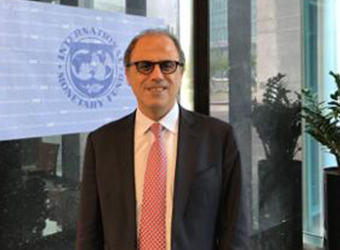INTERVIEW – Senior IMF official says lowering inflation key to Egypt’s reforms
Lowering Egypt’s three-decade high inflation is key to keeping the country’s economic reform programme on track and cutting the government’s budget deficit, the new head of the International Monetary Fund’s Middle East department said on Tuesday.
“We need to address inflation, because failing to address inflation would have a large social impact,” Jihad Azour, who took his post in March, said in an interview while visiting Dubai.
“Also, it will make the fiscal adjustment more difficult, because of the negative impact on subsidies as well as other issues. It will affect negatively the ability of the government to move on the reform programme, with the risk of second-round inflation.”
An IMF delegation arrived in Cairo on Sunday to review Egypt’s progress with the reforms, a condition for the multilateral lender to disburse the second instalment of a $12 billion loan programme agreed in November.
The reforms have included floating the Egyptian pound, which triggered a depreciation and eased a dollar shortage but also fuelled inflation. Annual urban consumer price inflation hit 30.9 percent in March, the highest in over three decades.
Azour, who previously served as Lebanon’s finance minister and as a senior executive at consultants Booz & Co, did not specify what actions Cairo should take to restrain inflation.
But he said the IMF review now underway was “an opportunity to look at all the policies the government is implementing”.
IMF spokesman Gerry Rice said in early April that the IMF would discuss both tighter monetary and fiscal policies as ways to bring down Egyptian inflation.
Azour said the IMF review was expected to be completed in the next couple of months, roughly in line with Cairo’s expectations. Finance Minister Amr El-Garhy said in mid-March that Egypt expected to receive the second instalment of the IMF loan in May or June.
The IMF is also providing financial assistance or policy advice across the rest of North Africa. In Morocco, it has been encouraging authorities to let the exchange rate move more freely to help fight inflation and shrink the country’s trade deficit.
The Moroccan central bank said last month the initial stage in a programme to liberalise the dirham would start in the second half of this year, but it is not yet clear how quickly a new government – formed only in April in the wake of last October’s election – will pursue the policy.
Azour said he understood the reform was on track to begin by the end of this year. “As planned, this move has been prepared by the central bank and communicated to the banking system, and is expected to be implemented in 2017.”
Source: Reuters


